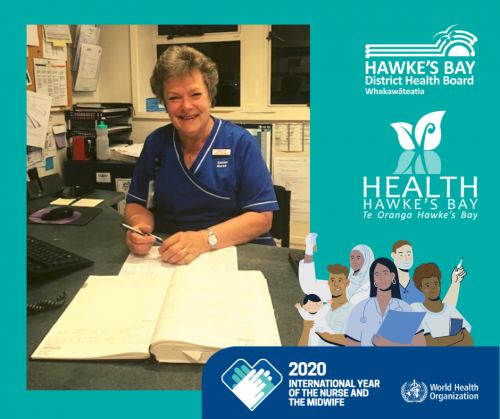
Sheryll Petrie remembers joining her parents on missionary visits in Papua New Guinea as a young child – a memory she is fond of and one which sowed her future nursing ambitions.
Those early years living in “a very primitive Papua New Guinea” saw her return to New Zealand and begin her nurse training in 1971 at Auckland Hospital.
“Come along nurse.” said the home sister, who took Sheryll to her room containing a bed, cabinet, desk and wardrobe.
“I was stunned she called me a nurse,” explains Sheryll.
“I was 17 years of age and had never set foot in a hospital. I was shy, naïve and overawed, but thus began my life’s vocation of nursing which I continue to have pride in. I feel privileged to nurse or encourage those who need my care, skills and experience.”
Celebrating her 50th year of nursing next September, and having worked across various specialties, Sheryll’s current role sits with the DHB’s highly skilled Duty Manager team. She says while the nursing practise has changed over the years, the sentiment of nursing is forever engrained at the grassroots.
“I recall mercury thermometers shaken down and wiped, put into small test tubes we had previously poked small wads of cotton wool into and filled with chlorhexidine. Stainless steel kidney dishes, pans and bottles were all vigorously boiled in sanitizers, ECGs were done by medical registrars until we learned not to burn the paper with the stylus when the paper jammed, and those blessed breast binders all had blunt safety pins which we ran through our hair to do some magic with to get the ends through the multiple layers.
“We had no care associates to watch patients or do ward tidies, we did the lot. Wherever did the sputum mugs go to? First metal then cardboard and all with lids and the wearing of full protective prevention – gloves masks and gown to change mugs and dispose of contents. Making warm poultices to soothe inflammation still gives me a warm memory feeling as the aroma and mucky play was so fulfilling. Those were the days!”
Sheryll says while today’s nurses are consistently managing higher acuity needs coupled with new technology, more complex documentation and care duties, the ‘people’ side to the nurse-patient-whānau relationship remains special.
“Patients still need feeding, elimination, pain relief and comforting. Relatives still need our care and listening ears. Colleagues still impact on our knowledge base, keep us grounded and support through thick and thin.
“The five-point star signifying the hand, foot, knee, breast and head continues to be presented at graduation ceremonies and worn with pride. It is this symbolic medal that has fulfilled the dream and aspirations of an 11-year-old.
“I have been blessed and achieved many goals. As my career nears the twilight years I want to thank those who have impacted on my life, both positive and negative, encouraged me, and seen me grow from a shy young woman to a mature experienced nurse.”






Post your comment
Comments
john miller 2 Dec 2020, 21:13 (4 years ago)
Well done Sheryll
No one has commented on this page yet.